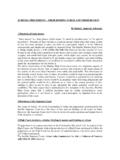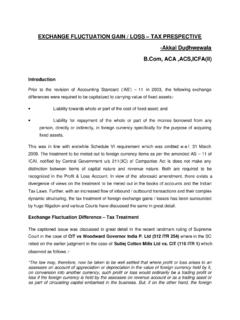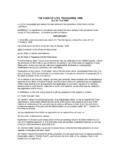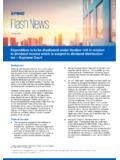Transcription of Section 131 of the Income Tax Act, 1961 - An …
1 Page 1 of 3 Section 131 of the Income Tax Act, 1961 - An overall view - By PARAS KOCHAR, Advocate POW ERS U/S 131 Section 131 is contained in Chapter XIII C of the Income Tax Act, 1961 . Section131 (1) has empowered the Income Tax Officer, Assistant Commissioner, Dy. Commissioner, Asst. Director, Dy. Director, Joint Commissioner, Commissioner (Appeal), Commissioners, Principal Commissioner, Chief Commissioner, Pr. Chief Commissioner and Dispute Resolution Panel for the purpose of this Act, with same powers which are vested in a court under Code of Civil Procedure, 1805 (5 of 1908) and Section 131(1A) of the Income Tax Act, 1961 has empowered the Director General, Director, Add. Director, Jt.
2 Director, Dy. Director or Asst. Director, to exercise powers conferred u/s 131 of the Income Tax Act, 1961 the powers conferred in Section 131 as vested in a court under code of civil procedure as under a) discovery and inspection; b) enforcing the attendance of any person, including any officer of a banking company and examining him on oath; c) compelling the production of books of account and other documents; and d) issuing commissions. Section 131 is comprised of two complementary sub-sections relating to two different classes of officers. Whereas Section 131(1) empowers the jurisdictional assessing officer to issue summons. Section 131(1A) empowers the officers of the investigation wing viz. Assistant Director, Deputy Director or the Director of Income Tax (Investigation) to issue summon.
3 Section 131 of the Income Tax Act, 1961 gives power to Tax Authorities to issue summons or to force attendance of any person for being examined on oath or to compel production of books of account and other documents if any proceeding is pending. However, notice u/s 131(1A) can be issued even if no proceeding is pending. Both the sections can be applied for the purpose of the Income Tax Act. Section 131(1A) of the Income Tax Act empowers the officers to issue notice under following circumstances a) before he takes action under clauses (i) to (v) of S. 132; b) has reason to suspect that Income has been concealed; and c) notwithstanding that no proceedings with respect to such person or class of persons are pending.
4 Application of mind for issue of summons If the information called for by the Income Tax authorities is, prima facie, without due care and application of mind, it vitiates the very foundation of summons sent. The information should not be called for in a routine mechanically and fishing manner Page 2 of 3 without application of mind. It has to be appreciated that an Income Tax authority is not entitled to exercise power under Section 131 (1A) as a mere cloak for making a fishing investigation and a roving inquiry. Validity of Summons issued u/s 131 If a summon is issued by an ADIT/DDIT u/s 131 in place of Section 131(1A) it was an invalid summon prior to introduction of Section 292(B) of the Income Tax Act, 1961 .
5 Summons not containing the required particulars or the inapplicable portion behind scored out such summons are not valid summons. In Braveries Ltd. Vs. UBI 241 ITR (446) the Bombay High Court has held that neither the blanks has been field up nor the inapplicable portion has been scored out so it was non application of mind and proceedings were stayed by the court. It was further observed by the court that it was not clear that summons were issued under Act, Act, Act and it was also not evident from the summons that in what connection and under which act the books of accounts were required to be produced. Nature & purpose of proceedings The person against whom the summons is issued is not entitled to know the full details of the nature & purpose of the proceedings in respect of which the summon is issued as held in respect of FEMA case 2009 110L: - 645: - : FEMA.
6 Personal Appearance In case of witness personal appearance is required as witness has no right of being represented by an authorised representative. However, a notice other then witness may be represented by his authorised representative in response to notice u/s 131. Referance can be made to the following case laws a) Jamnadas Madhavji & Co. vs ITO (1986) 162 ITR 331 (Bom.) b) V. Datchinamurthy V. Assistant Director (1984) 149 ITR 341 (Mad.) Issue of notice u/s 131 (1A) after conclusion of search There is a controversy in this respect. There are conflict decisions of different courts. Gujrat High Court in the case of Arti Gases v. DIT (Inv.) (2001) 248 ITR 55 has held that notices u/s 131(1A) can be issued after completion of search undertaken under the provisions of Section 132, as it would be absolutely logical to call for information so as to have better particulars or to have complete idea about the material seized during the search.
7 Gujrat High Court in the case of Neesa Leisure Ltd. v. UOI (2011) 338 ITR 460 has held how the satisfaction recorded by the Director General of Income Tax has subsequently issued notices under Section 131(1A) of the act. Page 3 of 3 In the decision of Allahabad High Court in the case of Dr. Mrs. Anita Sahai v. DIT (2004) 266 ITR 597 in which the High Court have held that there was neither reason to believe nor material before authorizing officer on the basis of which he could issue a warrant u/s 132. Issue of notice u/s 131 during survey Notice u/s 131 cannot be issued during course of survey u/s 133A excepting survey u/s 133A(6) and only under compelling circumstances. If the assessee during course of survey has not cooperated the survey team, notice u/s 131 can be issued, but if the assessee has afforded all the facilities to the survey party for conducting survey and also for recording of statement, no notice u/s 131 can be issued.
8 Further, the Income tax authority has no power to issue notice u/s 131 after conclusion of survey proceeding as notice u/s 131 can be issued only if proceeding is pending. In Gheru Lal Bal Chand v. ITO [1982] 137 ITR 190, the Punjab and Haryana High Court held that the Income Tax authorities have no jurisdiction to resort to the powers under Sub-sections (1) and (2) of Section 131 while surveying the accounts of the assessee under Section 133A when the assessee neither refused nor evaded to co-operate with the competent authority. Also in Dr. Vijay Pahwa v. Samir Mukhopadhyay, Deputy CIT [2001] 250 ITR 354 the Calcutta High Court considered the case where the survey was conducted on April 17, 1995, the summons under Section 131(1) were served upon him on the spot and the same were executed within thirty minutes or so.
9 The books and other documents, when produced before the authority in the Income Tax office, were impounded immediately. In the peculiar facts and circumstances of the case, the court held that the authority had exceeded its powers and the procedure adopted by the authority was illegal and amounted to high handed action. In practice more or less in every survey, the assessing officers issues notice u/s 131 during course of survey. The purpose of issuing notice is this that they want to call the assessee after the survey is over but they cannot do so because no proceeding remain pending after survey is concluded and hence as a matter of practice they issue notice u/s 131 during course of survey.
10 There are number of court decisions which say that notice u/s 131 during course of survey should not be issued by the Income Tax authority unless the assessee cooperates to the survey team. Notice u/s 131 is a very vital notice and the notice as well as the Income Tax authorities should be well aware of its scope, power, misuse and consequences. The Income Tax authority may use this Section as a weapon in their hands but at the same time the various courts has also imposed certain limitations on it. The noticee should always comply the notice u/s 131 properly and carefully and at the same time the Income Tax authority should not issue notice u/s 131 in every case.




![[2014] 4 S.C.R. 875 876 SUPREME COURT REPORTS …](/cache/preview/d/2/8/0/e/7/7/2/thumb-d280e772dfd93289085256c80928d2d6.jpg)




